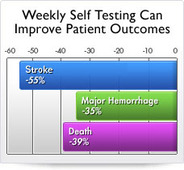How PT/INR Self Testing Works
PT/INR Self Testing now allows you to measure your blood's anti-coagulation level -- how long it takes your blood to 'clot' -- more often and more easily at home.
When you take Coumadin, it's important that your PT/INR be tested regularly.
Keeping your PT/INR within a safe range can help you to avoid serious complications such as bleeding or stroke, the 3rd leading cause of death in the U.S. and the leading cause of adult disability. Under normal circumstances, you may have been getting your PT/INR checked at your doctor’s office, lab or clinic once every four to six weeks. Studies show that more frequent testing can help you reduce serious risks to your health.
When you take Coumadin, it's important that your PT/INR be tested regularly.
Keeping your PT/INR within a safe range can help you to avoid serious complications such as bleeding or stroke, the 3rd leading cause of death in the U.S. and the leading cause of adult disability. Under normal circumstances, you may have been getting your PT/INR checked at your doctor’s office, lab or clinic once every four to six weeks. Studies show that more frequent testing can help you reduce serious risks to your health.
Half of all patients taking Coumadin or warfarin are reported to be out of their safe clotting range at any given time.PT/INR levels are affected by your medications, your diet and other factors. Studies show that people who test more frequently are more likely to keep their levels in the proper range, reducing their risk of either stroke or bleeding
|
Now PT/INR Self Testing can be prescribed by your doctor so you can control doing the test yourself.Testing can be done in your own home, or when you travel. You'll test weekly instead of monthly, and you'll know the results right away. PT/INR Self Testing takes just a few minutes, and because the Philips service sends the test results to your doctor right away, he or she can make immediate changes to your medication if required.
|






